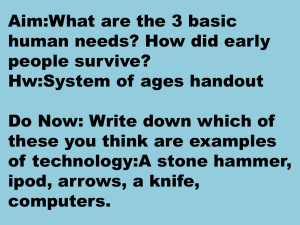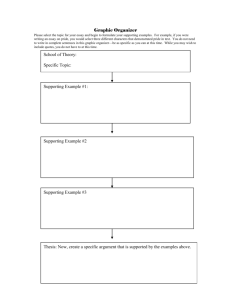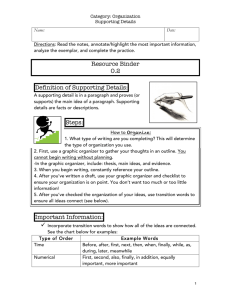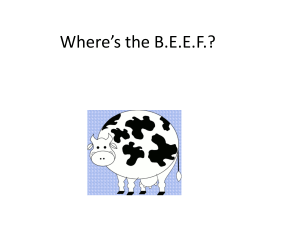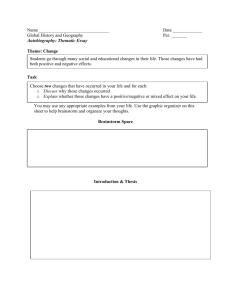Student - Valdosta State University
advertisement
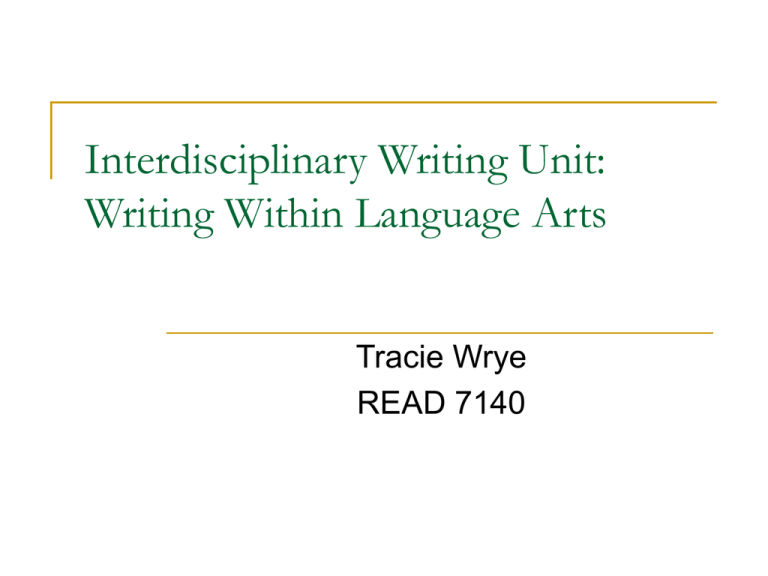
Interdisciplinary Writing Unit: Writing Within Language Arts Tracie Wrye READ 7140 5th Grade Content Area Reading and Language Arts Modes of Writing Expository and Persuasive Stages of Writing Process Stage 1: Prewriting getting-ready to write 70% of writing time brainstorming Use graphic organizers Stage 2: Drafting forming ideas into complete sentences Ideas down Neatness not an issue Stage 3: Revising Meet needs of the audience changing, adding, deleting, and rearranging content of draft Stage 4: Editing Students proofread and reread Pay attention to form Neatness matters Stage 5: Publishing Rewrite piece in best handwriting Share Grouping When grouping teacher will consider level of ability, linguistic capabilities, and behavior. Students with low ability: High ability student not paired with low ability student Not paired with high ability student Students with: EBD, ADD, ADHD not be paired together if behavior is problematic Grouping Continued. . . Prewriting: Students work cooperatively with whole class. Drafting: Students work cooperatively with writing partner. Revising/Proofreading/Editing: Students work cooperatively with writing partner. Publishing: Students work individually. Modifications / Accommodations Teacher: make needed modifications to ensure that all students are able to learn in least restrictive environment Teacher makes modifications according to: SST, IEP, and 504 plans. Students having EBD or needing closer supervision or more than the usual amount of explanation will be seated near the front of the room Students with visual impairments Not seated with other students with behavior problems Seated closer to the board and teacher Student with mild learning disability Seated with partner or in small group and have peer helper during publishing stage Methods of Instruction Model all stages whole group Practice using shared writing or shared pen activities Allow partners to help one another during practice Assessment activity should provide students time to independently practice all strategies taughtscoring guide and checklists used Georgia Writing Assessment Grade 5 Georgia writing assessment for grade five is an evaluation of student response to an assigned prompt Scored by trained raters Use standardized scoring system Evaluated to determine the developmental stage writing represents There are six developmental stages. (Georgia Department of Education, p.1-5). Developmental Stage Scoring Guidelines for the Georgia Grade 5 Writing Assessment Stage 1 – The Emerging Writer Stage 2 – The Developing Writer Stage 3 – The Focusing Writer Stage 4 – The Experimenting Writer Stage 5 – The Engaging Writer Stage 6 – The Extending Writer Language Arts content connection ELA5R1 Prior to lesson teacher will: Read book by Louis Lowery “Number The Stars” with students Researched with students this author Discussed findings with students Expository Preassessment Students write about a topic they learned about in Social Studies. Holocost Reassure, assessment not to be graded Students get no assistance Expository Writing Language Arts Georgia Professional Standard: ELA5W1 Reading Georgia Professional Standard: ELA5R1 Expository Writing Instruction Teacher explains to students that expository writing must: Have an introduction, a body, and a conclusion Engage the reader Completely address the topic Use descriptive language Same focus throughout writing Easily understood by the intended audience Conclusion gives the a sense of closure and satisfaction Persuasive Writing Language Arts Georgia Professional Standard: ELA5W1 Reading Georgia Professional Standard: ELA5R1 Persuasive Preassessment Students will write an opinionated essay about the Holocaust and what could have been done to prevent it from happening. Reassure, assessment not to be graded Students get no assistance Persuasive Writing Instruction Teacher tells students persuasive writing must: Have an introduction, a body, and a conclusion Engage the reader State your purpose Use descriptive language Arrange arguments for clarity Same focus throughout writing- one issue Convey a message that is appealing to audience Conclusion gives the a sense of closure and satisfaction Before Each Unit, The Teacher Will: Expository unit: Explain expository writing to students Introduce and explain graphic organizers How used in prewriting and editing How to research and use different materials to research Encyclopedias Internet Autobiographies Before Each Unit, The Teacher Will: Persuasive Unit: Explain persuasive writing and purpose To convince State a position on a topic Offer information Address an issue Introduce and explain graphic organizers How used in prewriting and editing How to research and use different materials to research Encyclopedias Internet Autobiographies Modeling Pre-Writing Teacher will: Model how to fill out a graphic organizer: Go through each section What information goes where Say “What would I put in this section?” Imitate writing in each section based on topic being discussed Fill out completely Writing Instruction Prewriting Student Will: Expository Unit: Complete expository–prewriting graphic organizer. Persuasive Unit: Complete persuasive–prewriting graphic organizer. Practice Activity: Students and teacher (with whole group) will: Expository: Using blank organizer Chose author and research (Louis Lowery- Chosen by teacher) Fill out organizer with researched information Working with partner to find information on given author Persuasive: Using blank organizer Fill out organizer with information Working with partner to find information on given author PERSUASIVE PLANNING SHEET Paragraph Four: Body 3 Name: ___________________________________ Date: ______________ Paragraph One: Introduction Topic Sentence: __________________________________________________________ ________________________________________________________________________ Introductory Statement: ___________________________________________________ Support one: ____________________________________________________________ ________________________________________________________________________ Example: _______________________________________________________________ Background Information: __________________________________________________ Support two: ____________________________________________________________ ________________________________________________________________________ Example: _______________________________________________________________ ________________________________________________________________________ Main Transition Sentence to Bodies (State your opinions and three reasons): ________ Support three: ___________________________________________________________ ________________________________________________________________________ Example: _______________________________________________________________ ________________________________________________________________________ Paragraph Two: Body 1 Closing/Transition Sentence: _______________________________________________ Paragraph Five: Rebuttal Topic Sentence: __________________________________________________________ Topic Sentence: __________________________________________________________ ________________________________________________________________________ ________________________________________________________________________ Support one: ____________________________________________________________ Objection one: ___________________________________________________________ Example: _______________________________________________________________ Support two: ____________________________________________________________ Example: _______________________________________________________________ Support three: ___________________________________________________________ Example: _______________________________________________________________ Closing/Transition Sentence: _______________________________________________ Paragraph Three: Body 2 ________________________________________________________________________ Rebuttal: _______________________________________________________________ ________________________________________________________________________ Objection two: ___________________________________________________________ ________________________________________________________________________ Rebuttal: _______________________________________________________________ ________________________________________________________________________ Topic Sentence: __________________________________________________________ Objection three: __________________________________________________________ ________________________________________________________________________ ________________________________________________________________________ Support one: ____________________________________________________________ Rebuttal: _______________________________________________________________ Example: _______________________________________________________________ ________________________________________________________________________ Support two: ____________________________________________________________ Example: _______________________________________________________________ Closing sentence: ________________________________________________________ Paragraph Six: Conclusion Restatement of Opinion: ___________________________________________________ Support three: ___________________________________________________________ Example: _______________________________________________________________ Closing/Transition Sentence: _______________________________________________ ________________________________________________________________________ Powerful Ending: ________________________________________________________ ________________________________________________________________________ Studying an Author/illustrator Student’s Name ___________________________ Author’s Name_________________________________ What other occupations did they have before becoming a writer? _________________________ ____________________________________________________________________________ Paragraph 1: ____________________________________________________________________________ Born: _________________________________ (place)______________________________ Paragraph 3: Background to become a writer School: (Did they enjoy going to school? Did they attend college? Where? If graduated, what degrees have they earned?) Date Died: _____________________________ Childhood: (list at least 3 facts): 1.___________________________________________________________________________ ____________________________________________________________________________ ____________________________________________________________________________ 2. __________________________________________________________________________ ____________________________________________________________________________ ____________________________________________________________________________ 3. __________________________________________________________________________ ____________________________________________________________________________ ____________________________________________________________________________ Paragraph 2- Family as an adult; Today, does he/she have a family? Family: (Married? Spouse’s name) ____________________________________________________________________________ ____________________________________________________________________________ Where does he/she live now? Or Where did he/she live? ____________________________________________________________________________ ____________________________________________________________________________ Children: ____________________________________________________________________________ ____________________________________________________________________________ ____________________________________________________________________________ ____________________________________________________________________________ ____________________________________________________________________________ How or when did they begin their writing career? ____________________________________________________________________________ ____________________________________________________________________________ Paragraph 4- The author’s books What was the name of the first book they wrote? ______________________________________ ____________________________________________________________________________ Have they won any awards for their books? Name the awards ____________________________ ____________________________________________________________________________ How many books have they written? _________ List two titles: _________________________________________________________________ ____________________________________________________________________________ Are the same characters in each one of the author’s books? Yes or no If yes, which characters? _________________________________________________________ ____________________________________________________________________________ Have they written a book series? (Author, Harry Potter, Hardy Boys, etc.) _________________ ____________________________________________________________________________ How many of their books do we have in our library? ___________________________________ Have you read any of their books? _________________________________________________ ____________________________________________________________________________ Other interesting facts: __________________________________________________________ ____________________________________________________________________________ ____________________________________________________________________________ ____________________________________________________________________________ Paragraph 5 -Conclusion Restate some topics discussed in body paragraphs and end with one interesting fact that really interested you about your author. ______________________________________________________________________________ ______________________________________________________________________________ ______________________________________________________________________________ ______________________________________________________________________________ ____________________________________________________________________ Assessment: Prewriting Student: Complete organizer Chosen author Researched and fill out organizer Teacher: Assess students’ completion of graphic organizer using the graphic organizer scoring guide. Scoring Guide Expository Prewriting 4 Exceeds Standards Graphic organizer Construction Details Reasons 3 Meets Standards 2 Progress Towards Meets Standards Student fills out most of Student fills out graphic graphic organizer and organizer but does not follows most of follow all of directions directions given by the given by the teacher. teacher. Student correctly fills out graphic organizer and follows all directions given by teacher. Details show strong opinion from the writer and ideas convey a clear message. More than three reasons Three clear reasons are for the writing are listed stated as a purpose of in the graphic organizer. the writing in the graphic organizer 1 Needs Improvement Student incorrectly completes graphic organizer or does not finish graphic organizer. Details are vague and do not clearly convey the message from the writer. One to two clear reasons No clear reasons for the for writing are listed in writing are listed in the the graphic organizer. organizer. Scoring Guide Persuasive Prewriting Graphic organizer Construction Details Reasons 4 Exceeds Standards 3 Meets Standards Student correctly fills out graphic organizer and follows all directions given by teacher. Details show strong opinion from the writer and ideas convey a clear message. More than three reasons for the writing are listed in the graphic organizer. Student fills out most of graphic organizer and follows most of directions given by the teacher. 2 Progress Towards Meets Standards Student fills out graphic organizer but does not follow all of directions given by the teacher. 1 Needs Improvement Student incorrectly completes graphic organizer or does not finish graphic organizer. Details are vague and do not clearly convey the message from the writer. Three clear reasons are stated as a purpose of the writing in the graphic organizer One to two clear reasons No clear reasons for the for writing are listed in writing are listed in the the graphic organizer. organizer. Modeling Drafting Teacher will: Model how to take information from organizer to: Make sentences and paragraphs Add details Imitate writing sentences and paragraphs Writing Instruction Drafting Student: Practices writing sentences from class completed graphic organizer Practices writing paragraphs to complete draft Practice: Students (with partner) will: Using blank organizer, create sentences and paragraphs Working with partner, create a introduction, body, and conclusion Assessment: Drafting Student: Use completed organizer Create sentences and paragraphs Create introduction, body and conclusion Teacher: Assess, using drafting scoring guide, students’ completed drafts made from their graphic organizer information. Scoring Guide Expository Drafting 1 Needs Improvement 2 Progress Towards Meets Standards Very few ideas were used from story map. 3 Meets Standards 4 Exceeds Standards Ideas were used from story map, but no others were added. All ideas included from story map. Student also added more ideas to story. Use of ideas No ideas were used from story map. Complete Sentences Student did not use complete sentences. Student used some complete sentences but had four or more incomplete sentences. Student used complete sentences throughout the draft, but had three or less incomplete sentences. Student used complete sentences throughout the entire draft. Introductory Paragraph There was no evidence of an introductory paragraph. Student included an introductory paragraph with characters only. Student included an introductory paragraph with the characters and a setting. Body of Story The story had no body or the body did not include complete paragraphs. Student included an introductory paragraph, but there was no evidence of a setting or characters. The story included details about each event, but not in paragraph form. The story included a paragraph for each event, but the paragraphs had three or less sentences. The story included a paragraph for each event taken from the story map and the paragraphs were well developed with a minimum of five sentences in each. Conclusion No clear conclusion to story. The story included a conclusion paragraph with two or less sentences. The story included a conclusion paragraph with three or less sentences. The story had a clear ending and was executed well with a minimum of five sentences. Scoring Guide Persuasive Drafting Use of ideas Introductory Paragraph Body of Story 4 Exceeds Standards 3 Meets Standards All ideas included from graphic organizer. Student also added more ideas to writing. Student included an introductory paragraph.. The writing included a paragraph for each event taken from the graphic organizer and the paragraphs were well developed with a minimum of five sentences in each. Ideas were used from graphic organizer, but no others were added. Supporting details Supporting details do not support the writer’s opinion. Issues Essay jumps around and does not have solid stand on issue being discussed. The writing had a clear ending and was executed well with a minimum of five sentences. Conclusion The writing included a paragraph for each event, but the paragraphs had three or less sentences. 2 Progress Towards Meets Standards Very few ideas were used from graphic organizer. 1 Needs Improvement No ideas were used from graphic organizer. The writing included details about each event, but not in paragraph form. There was no evidence of an introductory paragraph. The writing had no body or the body did not include complete paragraphs. Details are well thought out and support the opinion of the writer The writing included a conclusion paragraph with three or less sentences. Essay addresses one solid issue and writing reflects on that issue. The writing included a conclusion paragraph with two or less sentences. No clear conclusion to story. Model Revising Teacher will: Make a copy of draft Reread the first draft: changing, adding, deleting, and rearranging content of draft Use different color pen Discuss differences between the two with the class. Rewrite the rough draft with class Writing Instruction Revising Students will: Read through draft changing, adding, deleting, and rearranging content of draft Practice: Students (with partner) will: Make photocopy to compare to draft Read their drafts and add, delete, rearrange information using different color pen Assessment Revising Student: Use photo copy of their first draft to make revisions to own draft. Use different color pen Teacher: Assess students’ revised photo copy using the revising scoring guide. Scoring Guide Expository Revising 4 Exceeds Standards Details Elaborate details added exceeding five 3 Meets Standards Five or more details added Proofreaders marks Proofreaders marks used Additions Different color pen used for additions New characters added or details added about characters Characters 2 1 Progress Needs Towards Meets Improvement Standards Four to five No details details added added No proofreaders marks used No different color pen used No details or characters added Scoring Guide Persuasive Revising 4 Exceeds Standards Details Elaborate details added exceeding five 3 Meets Standards Five or more details added Proofreaders marks Proofreaders marks used Additions Different color pen used for additions New characters added or details added about characters Characters 2 Progress Towards Meets Standards Four to five details added 1 Needs Improvement No details added No proofreaders marks used No different color pen used No details or characters added Model Editing Teacher will: Show students proofreader marks How to use Scan for errors Use different color pen to make corrections Writing Instruction Editing Students will: Read through draft Making corrections: Spelling errors Capitalization Grammar errors Practice: Students (with partner) will: Read their drafts and use proofreaders marks to correct mistakes in grammar and capitalization using different color pens Assessment Editing Student: Edit photo copy of revised essays using a different color pen. Teacher: Assess students’ edited photo copies of their revised essays using the editing scoring guide. Scoring Guide Expository Editing 4 Exceeds Standards Grammar Corrections Partner Proofread No mistakes in grammar 3 Meets Standards One or less mistakes in grammar Used different color pen Partner read and made suggestions 2 1 Progress Needs Towards Meets Improvement Standards Three or less More than three mistakes in mistakes in grammar grammar Nor use of colored pen Student did not have a partner read and make suggestions Scoring Guide Persuasive Editing 4 Exceeds Standards Grammar Corrections Partner Proofread No mistakes in grammar 3 Meets Standards One or less mistakes in grammar Used different color pen Partner read and made suggestions 2 1 Progress Needs Towards Meets Improvement Standards Three or less More than three mistakes in mistakes in grammar grammar Nor use of colored pen Student did not have a partner read and make suggestions Model Publishing Teacher: Explain to the students that this is the final copy. Demonstrate how it is free of errors and written neatly. Writing Instruction Publishing Student: As a class work combining the sentences into a well written piece of work. Take their revised copies with editing marks and rewrite the essay. Practice Activity: Students: Practice with partner rewriting revised draft with no errors Assessment Publishing Student: Rewrite their own essay with no errors. Present or read essay to an audience.
